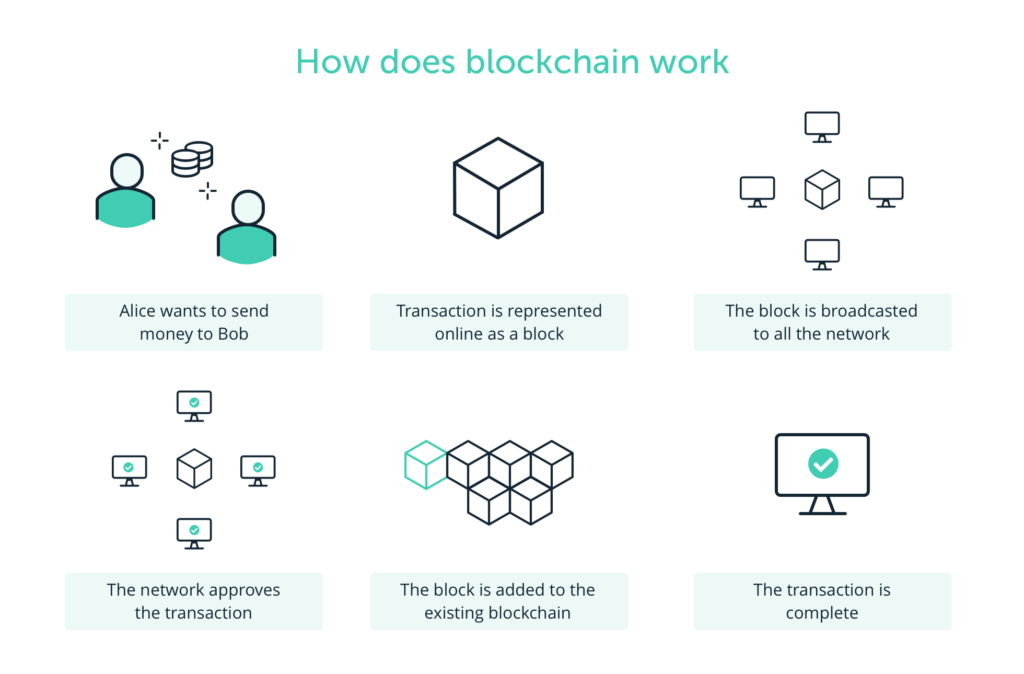Blockchain ledgers are digital records of transactions that are distributed across a variety of computers. This network of computers store and manage data in a secure and immutable manner. By using cryptography, Blockchain ledgers ensure that all transactions and data remain private and secure.
Blockchain ledgers also provide transparency, meaning all parties can see what is happening with the data. This allows for trust between parties, as well as increased efficiency by reducing the need for third-party intermediaries or manual processes.
In this article, we will discuss what Blockchain ledgers are and how they can be used to your advantage in a variety of industries. We will also discuss some of the key terms associated with Blockchain ledgers so you have a better understanding of how this technology works.
What Is Blockchain Technology?

Blockchain technology is a record-keeping system that creates a digital ledger of transactions, agreements, and contracts. It is the backbone of cryptocurrencies, but it can also be used to track anything of value—from money and property to medical records, digital identities, and confidential documents.
At its core, blockchain is a way to store and manage data using multiple computers connected to the blockchain network. A blockchain ledger consists of data blocks connected together in an immutable chain. Every time a transaction is made or agreement signed, all participating copies of the shared ledger on the network are updated so that everyone has access to the same information.
Thanks to its distributed nature and cryptographic security features, blockchain ledgers are public, tamperproof, and provide a permanent record of every transaction made in them. This means that data stored on a blockchain ledger cannot be altered without leaving visible evidence of tampering—an extremely valuable feature in verifying contracts or other agreements between parties.
How Does a Blockchain Ledger Work?

Blockchain ledgers are databases that keep track of data, much like traditional ledgers. That being said, there are several distinguishing features that set blockchain apart from other digital ledgers.
The most important distinguishing feature is the way in which data is stored and tracked. Traditional ledger technology stores data in a central location and can be accessed by one party at a time. Blockchain, on the other hand, uses a decentralized system to store data across multiple computers at once. This allows for greater security as the data is not stored in one place, meaning it can’t be easily changed or tampered with. Additionally, because of its distributed nature, blockchain can facilitate secure communications without any one central authority being involved.
Another key factor that makes blockchain different from traditional ledgers is its transparency. All transactions conducted using blockchain technology are recorded on what is called a public ledger, meaning anyone with access to the ledger can view the transaction history of any given address on the network.
All in all, blockchain technology offers many advantages over traditional ledger technology due to its decentralized storage system, secure communications capabilities, and transparent public record of transactions.
Types of Blockchains: Public and Private
Blockchain ledgers come in two primary types: public and private. Public blockchains are open, transparent networks with no one in control. Any user can join the network, view the ledgers, and add to them. On the other hand, private blockchains require permission from the network administrators to join and view the ledgers.
Public blockchains are often used for cryptocurrency transactions. They offer their users a high degree of security through cryptographic algorithms that make it impossible for anyone to alter information stored in the blockchain ledger. Private blockchains, however, can be used for more secure and private data management, such as tracking personal health records or financial transactions.
Both public and private blockchain ledgers offer users a level of trust that is difficult to obtain through traditional centralized systems where a single party has control over all data transactions. These types of independent networks have become popular among businesses dealing with sensitive information who require their customers to trust them with their permissions-based records without relinquishing complete custody of their data.
Benefits of Blockchain Ledgers

Among the many benefits of blockchain ledgers, the most important is its ability to store and transfer immutable data. The records stored in a blockchain ledger are secure and cannot be altered or deleted by any third party. This makes it an ideal choice for digital contracts, as the terms of a contract cannot be changed unless both parties agree to do so – giving users greater trust and security in their online transactions.
Another key benefit is transparency. Every user on a blockchain ledger can view all previous transactions, which helps ensure fairness and accuracy. This feature can be especially useful for organizations that need to keep track of sensitive information or resources. It also provides an audit trail that can help detect fraud or discrepancies in a timely manner.
The decentralized nature of blockchain technology also ensures faster and more reliable processing speeds than traditional methods. Transactions are verified on multiple computers around the world, meaning there is no single point of failure which could slow down the system or cause downtime.
In addition, blockchain technology has low transaction costs compared to traditional banking systems, which can be beneficial for businesses or individuals who regularly make international payments using cryptocurrency. This lets users save money while still making secure transactions quickly and easily – making it an attractive option for those looking to save time and money with digital transactions.
Challenges Associated With Blockchains
Blockchain ledgers come with a few challenges, which makes them less than perfect for every use case. For example, scalability is a major challenge when it comes to public blockchains – due to their architecture, the amount of transactions they can process is limited.
Another issue is that blockchains are immutable; once information is recorded on the blockchain it cannot be changed or reversed. This could lead to potential problems if incorrect information is entered into the ledger.
Finally, there is the issue of privacy with public blockchains. All information on these types of ledgers is visible to everyone who has access – which can create security issues if sensitive data needs to be stored in the blockchain.
For this reason, permissioned (or private) blockchains are becoming increasingly popular for businesses that need greater control over their data and security – companies such as IBM and Microsoft provide cloud-based permissioned blockchains that enable companies to securely store data without sacrificing their privacy.
Exploring the Future Potential of Blockchain Ledgers

The ledger technology within blockchain systems is still being explored and developed, with a range of potential applications which are just beginning to be understood. Blockchain ledgers have the potential to revolutionize a variety of industries, including finance, healthcare, and government.
Some potential use cases include:
- Finance: Blockchains could enable secure and instantaneous cross-border payments directly between two parties without using an intermediary such as a bank.
- Healthcare: Medical records could be securely stored on blockchain networks, ensuring privacy and preventing tampering or data loss.
- Government: Voting systems and other government services could leverage the security of blockchain ledgers, while also increasing transparency and citizen engagement.
As this technology continues to evolve, it’s likely that more use cases will be unveiled in the near future. Blockchain ledgers have the potential to transform how we communicate, transact and interact with each other – however only time will tell if this technology will live up to the great promise it holds today.
Conclusion
In conclusion, blockchain technology has the potential to revolutionize the way data is stored, accessed, and transferred. As the technology continues to evolve, developers and researchers are working tirelessly to push the boundaries of what is possible with blockchain ledgers. With blockchain ledgers, companies can look forward to increased security, easier access to data, and improved efficiency. As it continues to gain traction, blockchain ledgers will likely become the standard for data storage and management.
